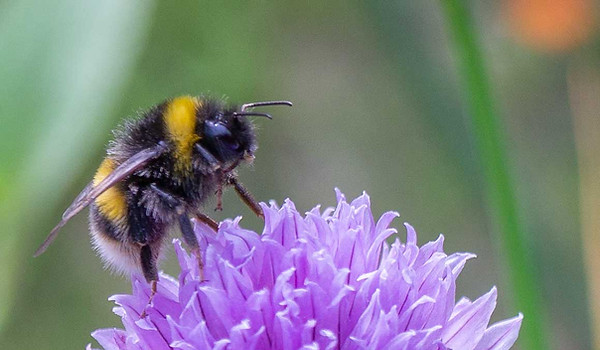Build Biodiversity
Early in 2020, Castleknock TidyTowns hired Wild Work (a biodiversity company) to carry out a biodiversity place mapping survey of the village to better understand the various species of animals, birds and insects who also call Castleknock home. Castleknock is home to urban foxes, hedgehogs, badgers, a whole variety of garden birds as well as butterflies, bees and other insects. Since then we have followed the advice we gained and promoted more sustainable living (and gardening) to protect habitats and build biodiversity.
Planting For Pollinators

Planting specifically with pollinators in mind is a key activity which Castleknock TidyTowns has undertaken in close partnership with Fingal County Council. Ten new pollinator-friendly perennial flower beds have been added which CTT volunteers maintain. We have planted under pedestrian barriers and on waste ground to create food-source corridors for pollinators.
Tree Planting
Europe's average land forest cover rate is 35% but Ireland lags behind at only 11%. In recent years we have planted thousands of trees in Castleknock. We focus on planting Rowan, Sweet Cherry, Bird Cherry, Hawthorn, Blackthorn, Alder, Willow and Beech both as trees and hedging. We plant various green spaces with prior approval from residents' associations and Fingal County Council. We have planted a number of Open Orchards, such as those at Park Avenue, Auburn Avenue and Ashleigh. We aim to have a mini-orchard for each estate which has a suitable green space available.

Bulb Planting
Bulb planting is an activity that we undertake each Autumn in Castleknock. Daffodils make a bright show on the approach roads, e.g. on Castleknock Road (at the Castleknock Gate of the Phoenix Park and around the Deer Sculpture) and on Auburn Avenue. Tulips, Alliums and Camassia extend the colour after the daffodils fade and result in areas being more appealing so they can remain un-mown for longer. We have also planted snowdrop bulbs under all of the trees along Auburn Avenue - snowdrops are often seen as heralds of Spring, and as symbols of hope.

Polytunnel
In 2024, thanks to a partial grant from Fingal County Council and generous donations received through a GoFundMe campaign, we purchased a polycarbonate polytunnel (6m x 4m). The Castleknock Lawn Tennis Club very kindly allowed us to located the polytunnel within their grounds and Brady's of Castleknock agreed to supply the water. Volunteers produce plants from sustainably sourced seed each Spring and also propagate new plants at this location too. The polytunnel enables tender plants to be over-wintered safely. Over time, Castleknock TidyTowns hopes to become 100% self-sufficient with plants grown locally for the planters and baskets in Castleknock village.

Leaf Mould
When Autumn comes, our volunteers collect fallen leaves in leaf bays (cages) which we have erected in various locations throughout the village. You can see some bays along Auburn Avenue where the leaf fall is most abundant each year. In less than one year leaf mould is created and this water-retentive material is spread at the bases of trees, in pollinator beds and in planters to improve the quality of Castleknock's soil and growing potential.

Reduced Mowing
Over a number of years, CTT has actively supported FCC's reduction in the mowing frequency of grass verges and green spaces to create mini-meadows within the urban environment. CTT has promoted 'No Mow May' and encouraged residents to allow verges and areas of their gardens to simply grow wild. These steps help to provide resources for insect pollinators, while being more cost-effective and less labour-intensive than sowing a site with a seed mix. Sowing 'wild flower' seeds purchased in supermarkets etc. can pose certain risks as they may introduce plant species which may be new genotypes. If you wish to see wild flowers grow in your garden, leave an area un-mown and nature will do the rest. Otherwise, always source Irish certified seed.

Little Wild Gatherings
Little Wild Gatherings aim to reach parents of young children to introduce concepts of sustainability and 'doing more with less'. We look at interesting aspects of nature such as growing seed or the lifecycle of a leaf in an interactive and engaging way. Two modules are run each year, one in Spring and one in Autumn. They are hugely popular with the children and parents who take part as well as with our volunteers.

Wild Garden Competition
We encourage our volunteers and local residents to avoid the use of pesticides, herbicides and insecticides. Sustainable gardening, the use of water butts and composting are all promoted through our social media channels. To give everyone a little extra encouragement we run an annual competition with prizes for the garden which best meets that year's focus. We also select a Best Estate. Check out the winners from our most recent competitions following the links below:
https://www.castleknocktidytowns.com/post/winner-ctt-s-glorious-garden-2023
https://www.castleknocktidytowns.com/post/ctt-2024-wild-garden-competition-winners

Swift Nesting Boxes
.png)
Swifts are a species in decline around the world so it is wonderful that some swifts have chosen Castleknock as their Irish summer home. During Castleknock TidyTowns habitat mapping project, swifts were observed at St Brigid's National School and also at St Brigid's Church. Swifts come from South Africa each year just for the summer where they breed and raise their young.
To encourage a larger population to nest in the buildings in the three Castleknock primary schools and Castleknock College, CTT purchased and installed triple swift-nesting boxes from Castleknock TidyTowns's funds (with part-funding from Fingal County Council).
Habitat Mapping
William O’Halloran of Wild Work visited Castleknock in June 2020 and made a video of the areas of importance for biodiversity. The video is just under 40 minutes long and shows William exploring Castleknock and pointing out the main areas of interest. You can also download his full written report here.
.png)